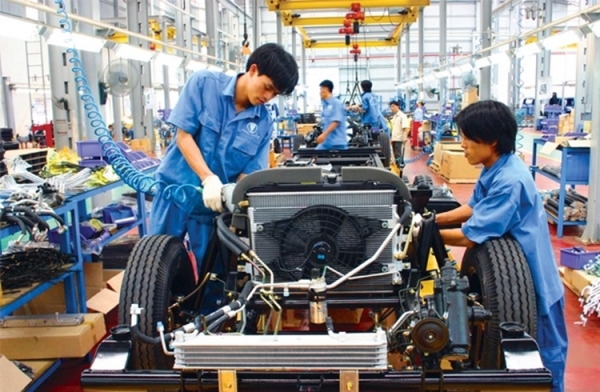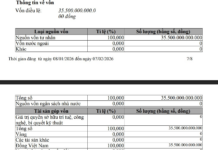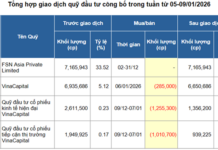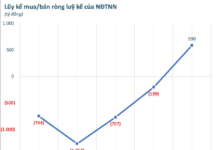Still have to import semiconductor chips
According to statistics from the Ministry of Industry and Trade, the automobile industry is currently importing 80% of production components. However, with the current rapid development of the automotive industry and the forecasted trend of ongoing growth in the future, it will be a “bright spot” in promoting the strong operation of supporting industries.

The automotive industry is one of the industries that needs to increase localization through supporting industries.
The Department of Industry (Ministry of Industry and Trade) also pointed out that there are still relatively few domestic supporting enterprises in the automotive industry in Vietnam, with only about 300 enterprises from all economic sectors. Among them, there are about 40 automobile manufacturing and assembly enterprises; 45 chassis and body manufacturing enterprises; 214 component and spare parts manufacturing enterprises…
In reality, Vietnamese companies are currently only producing and processing less than 300 components, while a complete car consists of about 30,000 components. In addition, the technology level and value of these components and spare parts are not yet high, as they are still basic components that require a lot of labor such as seats, wiring harnesses, wheels, door trims, non-pneumatic tires… and some companies invest in body and shell stamping lines. Critical components such as engines, transmissions, safety systems, electronic systems in vehicles, especially semiconductor chips, are not produced domestically and are heavily dependent on imports.
Moreover, the production of automobiles also relies heavily on semiconductor chips. On average, a vehicle has hundreds of semiconductor parts, leading to about 1,400 types of chips in each car. However, no domestic enterprise is currently capable of producing a complete chip, and all chips must be imported from abroad.
The Ministry of Industry and Trade has identified many reasons for the underdevelopment of the domestic automotive supporting industry as expected, such as weak policies and mechanisms, inadequate distribution and consolidation, limitations in human resources and competitiveness of enterprises. Nevertheless, in recent times, domestic industrial supporting enterprises have gradually improved their level of production, creating products with high technology content and precision, contributing to value-added.
Need to establish a domestic production and component supply chain
With the forecasted domestic automobile demand in 2025 averaging around 800 – 900 thousand vehicles and in 2030 around 1.5 – 1.8 million vehicles, if the domestic automobile manufacturing and assembly industry is not developed, the entire passenger car market will be reliant on imported vehicles; imports account for 50% of commercial vehicles and trucks, while 50% are produced domestically with a localization rate of 50%. In this case, the estimated import turnover in 2025 will reach about 12 billion USD, and in 2030 it will be 21 billion USD. According to assessments, if there are no timely solutions and support policies for the manufacturing and assembly of automobiles and supporting industries to develop, Vietnam will become a car consumption market for FDI companies in Vietnam.
To achieve this, businesses need to collaborate and support each other, moving towards building a nationwide network for production and product supply.
Mr. Pham Tuan Anh, Deputy Director of the Department of Industry, stated that in recent times, the Ministry of Industry and Trade has implemented many solutions for managing and developing industrial clusters under Decree No. 68/2017/ND-CP of the Government, emphasizing the role of trade promotion activities and connection between domestic and international enterprises. The potential of the supporting industry in Vietnam has been recognized by international friends. “The Government’s support policies are becoming more and more closely aligned with businesses. That’s why some major global automotive companies have recently shifted from importing completely built-up vehicles to automobile assembly in Vietnam,” Mr. Pham Tuan Anh stated.
According to the representative of the Department of Industry, the active participation of leading businesses in the automotive industry such as Thaco and Vinfast plays an important role in promoting the development of the supporting industry. This is an opportunity for second-tier component suppliers to exchange, research, improve skills, and product quality.
In addition to the support of leading companies, the automotive industry also needs strong policies to address issues such as high investment costs with low production volume and the lack of high-quality material industries… to quickly narrow the cost gap, expand the domestic component network, and promote the development of the supporting industry in the future.
Vietnam is an economy in transition, so it is necessary to adjust, change, and supplement policies to make them suitable. The development of the automotive supporting industry will be a driving force, promoting the development of other industries such as metallurgy, plastics, rubber, chemicals, textiles, electronics…, contributing to solving employment needs, creating value-added for the economy, and stimulating domestic consumption.



































